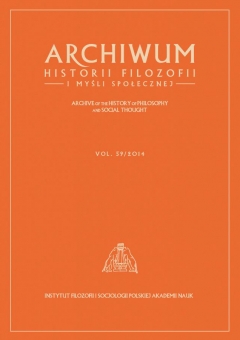Transzendentalphilosophie als Geltungsrelexion? Zur Philosophie Heinrich Rickerts
Is Transcendental Relection a Relection on Validity? Remarks on Heinrich Rickert’s Philosophy
Author(s): Andrzej LisakSubject(s): Epistemology, Phenomenology, Ontology
Published by: Instytut Filozofii i Socjologii Polskiej Akademii Nauk
Keywords: Heinrich Rickert; transcendentalism; neo-Kantianism; epistemology; theory of knowledge;
Summary/Abstract: Transcendental philosophy nowadays is identified with the reflection on validity and validation, with Geltungsreflexion (Habermas). But since the heated debate between Kuno Fischer and Adolf Trendelenburg in the development of transcendental philosophy two distinct directions became evident. One of the directions, developed by the Baden School of neo-Kantianism and later by so called neoneo-Kantianism (Hans Wagner), begins with distinguishing of subject and object of knowledge. The aprioristic strength of transcendental subjectivity increases and the sphere of objects is reduced to the pure facticity. The validation of all objectifications is presented as an achievement of transcendental subjectivity. he second direction is represented by Alois Riehl, Marburg School of neo-Kantianism and Husserl’s phenomenology. Transcendental philosophy practiced in this vein is a way of reaching the being via consciousness, whereas consciousness has to be defined as prior to any conceptualization and constitution of subject and object (consciousness cannot be identified with the real existing subject, otherwise transcendental philosophy cannot be considered and analyzed as a theory of constitution). The unity of transcendental philosophy is here understood as a unity of human world of meanings, i.e., as a world conceptualized as noematic unity. When understood in this way, transcendental philosophy inevitably becomes an ontology. The paper analyzes Rickert’s thought by questioning its transcendental nature. Rickert reduces transcendental reflection to a mere procedure used within the confines of theory created beforehand, to a procedure whose sole aim is to solve the problem of the objectivity of knowledge, unlike Marburg School and Husserl’s transcendental philosophy, which were striving for universal method of philosophy that would arrange its whole realm.
Journal: Archiwum Historii Filozofii i Myśli Społecznej
- Issue Year: 59/2014
- Issue No: 59
- Page Range: 211-229
- Page Count: 19
- Language: Polish

